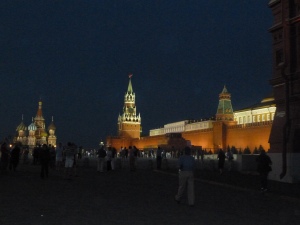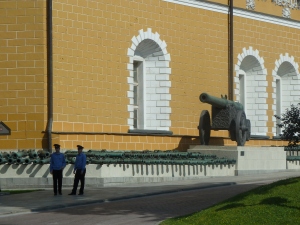
Photo credit: M. Ciavardini
I’m not sure what I expected to see within the walls of the Kremlin, the centuries-old fortress that is the seat of the Russian government. That old cannons from Russia’s own War of 1812 were there surprised me as these belonged to Napoleon, who, with his army, took up residency, however brief. I was surprised that, 200 years later, the Russians choose to keep these old reminders of a tough-won war (they had to surrender their city, essentially, to defeat the French army) right here in their capital.
In the news, or even as I stand before it, the Kremlin seems a large, imposing structure. How could the Russians surrender it so easily? I am reminded of the United States’ War of 1812, the one that had Americans fleeing their own capital, the one where the British burned the White House, the one whose victory was far from certain. Battles in both wars had to be won elsewhere. I lived in D.C. for more than a decade, but I can’t remember if any remnants of that particular British invasion remain.
Looking at Napoleon’s weaponry, I am reminded about how little I know about the history of his time. France apparently wanted Russia to participate more in a trade war (i.e., blockade) against England. Apparently dissatisfied when Czar Alexander I declined because the Russian economy was suffering, Napoleon decided to retaliate. Although he hated England, he opted to pursue Russia instead.

The French-British hostility, meanwhile, extended to trade efforts with the United States. Although the United States had won the Revolutionary War, England apparently wasn’t going to make it easy for the fledgling nation to exist. Neither France nor Britain wanted the United States trading with the other. Great Britain went a bit further and overtook U.S. ships and impressed sailors into service and encouraged Indian raids on U.S. settlements. Ultimately, the United States declared war on Britain.
Standing within the Kremlin, observing Napoleon’s former cannons, I am reminded of the interconnectedness of all of these events. Writing, in December, about my visit, I wonder how Napoleon, coronated as emperor of France in 1804, could find himself fleeing Russia eight years later, on his way, eventually, to defeat at Waterloo.
Note from the Brawny Sherpa: If you are ever standing in the Kremlin, and you want to meander off the tour and try to touch one of Napoleon’s cannons, you’ll hear someone blowing a whistle at you and screaming nyet, nyet. Pay no attention and touch it anyway. How many times in your life do you get to do something like that?
© Lori Tripoli


